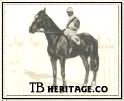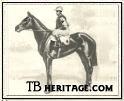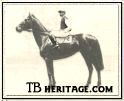| |
|
|
|
|
Colonial Family Quick Links
|
|
|
|

|
|
|
|
|
Colonial Family: Finesse
 |
Finesse, by imported Tros, was bred in 1849 by Nelson Lawson, probably at one of his huge runs on the Liverpool plains, or one of the holdings of his father's, William, in the same vicinity. Lawson senior also had a large grant and racing stud at Prospect, NSW, where he built a forty-room mansion, Veteran Hall, in or around 1812. Baron (1816, by Milo) and the good sire (Lawson's) Emigrant (1831, by Tramp) were two stallions imported by William Lawson, and the great early stallion Theorem spent part of his stud career there. Horses bred at Veteran Hall stud included Spring Gun (1825, by Steeltrap), a successful runner and later stallion at Bathurst; Plenipotentiary (c. 1840, by Lawson's Emigrant), and the ancestral mares Fair Helen (Family C - 19) and an unnamed mare at the root of the Lilla family (Family C - 8). Nelson Lawson bred, among others, AJC Australian Stakes winner Tranby (1837, by Operator), the influential stallion Teddington (c. 1844, by Tros), and (Lawson's) Tros (c. 1845, by Tros).
Nelson (died 1849) preceded his father in death by a year, and it apears that William's vast holdings, estimated at near a half million acres, passed to his son William Lawson, Junior, who had married Caroline Icely, sister of the noted early thoroughbred breeder Thomas Icely. It's probable that Finesse, whose dam, Flirt, was by the bay arabian stallion Mariner (imported sometime between 1830 and 1840 by Captain John Lamb) was also bred by the Lawson family; Mariner is known to have served as a stallion in the Bathurst district, and Flirt's dam, Polly, was by imported Baron, owned by William Lawson. Finesse's third dam was a "pure Arab mare."
Finesse was probably one of the mares that passed to Lawson's daughter, Caroline Icely and her husband, Thomas, after William's death. She was part of the consignment purchased from Icely's Coombing Park stud at Carcoar, near Bathurst, and imported into Nelson, New Zealand, by that country's "father of the turf," Henry Redwood in 1852. This particular group from New South Wales included the great broodmare Flora McIvor, the extremely influential stallion Sir Hercules, and such founding colonial mares as Moth (Family C - 6), Woodstock (Family C - 28), and probably Princess.
In New Zealand Finesse bred four foals for Edward Fairhall at Nelson. They were Clyde (1854), and three siblings by Sir Hercules -- Chance (1855), Colonel (1856), and Revoke (1857). The bay filly Revoke won the Canterbury Cup of 1863 for Henry Lance, a successful Canterbury owner. Schooled by the famous early trainer William Webb, Revoke eventually became part of his small, high-quality broodmare band, which also included the good early racemare Ada (Princess Family), and for Webb Revoke produced Trump Card (see below).
In 1858-59 Finesse passed into the hands of Richard Parkerson, a stock owner on the Halswell River near Christchurch. For him she produced five more foals: Coquette (1859), and Lord Chancellor (1862), and three colts that were later gelded, Prime Minister (1860), Statesman (1861), and Premier (1864).
It was Chance, the black sister of Revoke, that continued the family line into the present: her branch included the half-sisters Una Fine (1968) and Art Spinner (1969) both of which have descendants today. The most notable winners in the family, other than the early mares and Trump Card, were the sons and daughters of Blackada (1911, by All Black): Novar (1919), Clandu (1920), and Clarinda (1921) were all winners of the Manawatu Cup in the 1920s, and Piuthair (1922, see below) was a high-class stayer.
|
Notable Descendants
|

|
| Novar
|

|
| Piuthair
|

|
| Royal Blood
|
|
|
Trump Card ch.c. 1874
(Traducer - Revoke)
Bred, owned and trained by William Webb at Bush Inn, Riccarton, who also during this period had CJC Derby winner Songster and Canterbury Cup winner Le Loup (by Traducer) in his stable. Webb had come over to New Zealand from England in charge of the stallion Traducer and the soon-to-be famous matron Mermaid, and found work as a trainer for W.H. Harris. Webb obtained Henry Lance's Canterbury Cup winner Revoke, and bred her to his former charge, Traducer, in 1873, who by then had already gotten some very good winners in New Zealand, including four previous winners of the Canterbury (New Zealand) Derby. Trump Card was the first racehorse owned by George Stead, at that time serving as the honorary treasurer of the Canterbury Jockey Club, who would go on to become one of the country's most prominent racehorse owners. Trump Card won races at all distances, including the CJC Champagne Stakes and Christchurch Plate, the Canterbury (New Zealand) Derby, the Dunedin Derby, and the Queen's Plate at Dunedin (24 furlongs).
Piuthair b.f. 1922
(Kilbroney - Blackada)
High class staying race mare, she won many handicaps for her owner R.A. McKenzie, and in 1926-27 her triumphs put him at the top of the leading owner's list in New Zealand. Her wins included the Dannevirke Telephone Handicap, the Autumn Plate at Riccarton, Wellington's Silverstream Handicap, CJC Metropolitan Handicap (all in 1926), the Wanganui Cup, the Taranaki Jubilee Cup, the Egmont Cup, Riccarton's Sockburn Handicap and the CJC Great Autumn Handicap (all in 1927). Her sire, Kilbroney, was among the leading sires of the 1920s, his other offspring included Melbourne Cup winner The Banker and New Zealand Cup winner Oratrix (Family C - 20). Blackada produced three other good offspring, all winners of the Manawatu Cup; unfortunately, neither of Blackada's good winning fillies established successful flat racing branches of this family. Blackada's gelded son, Novar, was a good handicapper at smaller venues. He raced for Darby Munro from Palmerston, and won, in addition to the Manawatu Cup, the Rongotea Handicap at Feilding, Woodville's Welter Handicap and Autumn Handicap, Pahiatus' Konini Handicap, the Wanganui Autumn Handicap and Earle Stakes.
Royal Blood blk.g. 1918
(Our King - Sanguinary)
Raced by Wenzl Schollum, an Auckland-based owner who was an original subscriber to the District Training Racks Ltd. company, which purchased part of William Walters' Glenora Stud property to establish the Takanini course; he also owned the good handicapper Ruapapa. Royal Blood was trained for most of his career by Frank Loomb at Te Awamutu, who was also the trainer of the Great Northern Oaks winner Prodice. Royal Blood was a good sprinter in New Zealand: he won both the Railway and Electric Handicaps at Auckland in 1922; Dargaville's Hobson Handicap and Auckland's Electric Handicap for the second time in 1923; Takapuna's Suburban Handicap, Avondale's Flying Stakes, and the Electric Plate at Riccarton in 1924.
|
|
Bold=winners of stakes races and important handicap and weight-for-age races
mare by an arabian
Polly (f. c.1820) by Baron
Finesse (br.f. 1849) by Tros
Chance (bl.f. 1855) by Sir Hercules
| Last Chance (br.f. 1879) by The Painter
| Variety (ch.f. 1889) by Natator
| | Fancy Work (ch.f. 1900) by The Workman
| | | Ribbonwork (ch.f. 1917) by Camp Fire
| | | Gold Morn (f. 1925) by Acre
| | | | Lalene (f. 1931) by Mintleaf
| | | | Natalene (f. 1940) by Illumination
| | | | Gold Spinner (f. 1955) by Robin's Reward
| | | | Fine Art (b/br.f. 1961) by Gigantic
| | | | Una Fine (gr.f. 1968) by Our Boy
| | | | Art Spinner (blk.f. 1969) by Colonel Ayre
| | | | Proper Art (br.f. 1972) by Proper Pride
| | | | Top Art (br.f. 1975) by Top Role
| | | Silk Sox (bl.c. 1929) by Royal Divorce
| | Comedian (c. 1904) by Merriwee
| | Armada (br.f. 1901) by Torpedo
| | Blackada (br.f. 1911) by All Black
| | Novar (br.g. 1919) by Sarto
| | Clandhu (br.c. 1920) by Martain
| | Clarinda (b.f. 1921) by Kilbroney
| | Piuthair (b.f. 1922) by Kilbroney
| Sanguine (br.f. 1898) by Apremont
| Sanguinary (bl.f. 1908) by Sylvia Park
| Royal Blood (blk.g. 1918) by Our King
Revoke (b.f. 1857) by Sir Hercules
Premier (ch.c. 1870) by Malton
Trump Card (ch.c. 1874) by Traducer
|
|
|

